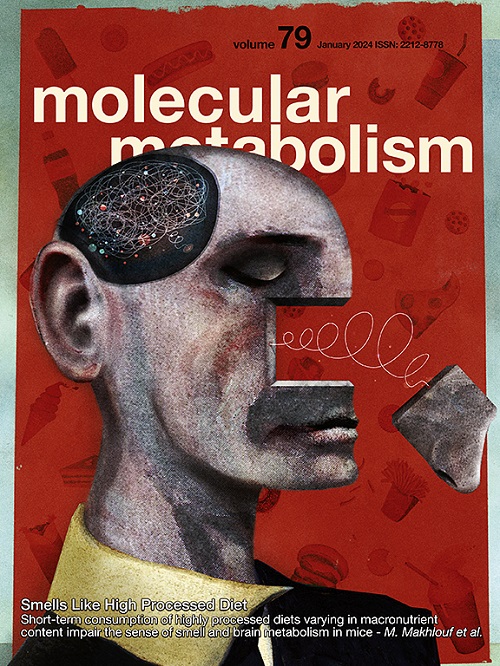过氧化物酶体和 PPARs:作为癌症代谢主调节器的新角色。
IF 7
2区 医学
Q1 ENDOCRINOLOGY & METABOLISM
引用次数: 0
摘要
癌症是一种以获得多种独特特征为特征的疾病。人们早就知道,癌细胞的新陈代谢与正常细胞有很大不同。最明显的新陈代谢变化是癌细胞强烈依赖有氧糖酵解进行葡萄糖转化。此外,癌细胞还经常发展出利用脂质和脂肪酸来满足能量需求的机制。过氧物酶体是这些脂质代谢适应性变化的核心。过氧物酶体是一种代谢细胞器,参与了 50 多种对细胞功能至关重要的酶促反应。因此,它们对于有效、全面地利用提供给细胞的脂质能量至关重要。癌细胞中过氧物酶体的生物生成显著增加,过氧物酶体提供酶功能所需的蛋白质表达也有所增加。此外,过氧物酶体中 FAs 的酶促转化是活性氧和氮物种(ROS/RNS)的重要来源,对癌症的恶性程度有很大影响。过氧物酶体 FA 氧化和 ROS/RNS 生成的重要调节因子是过氧物酶体增殖激活受体(PPAR)家族的转录因子。本综述介绍了受过氧物酶体影响的肿瘤发生和癌症进展过程中的代谢变化。我们将强调过氧物酶体和 PPAR 在肿瘤发生发展的不同阶段所扮演的矛盾角色,并总结我们目前对如何利用过氧物酶体生物学知识治疗癌症的理解。本文章由计算机程序翻译,如有差异,请以英文原文为准。
Peroxisomes and PPARs: Emerging role as master regulators of cancer metabolism
Cancer is a disease characterized by the acquisition of a multitude of unique traits. It has long been understood that cancer cells divert significantly from normal cell metabolism. The most obvious of metabolic changes is that cancer cells strongly rely on glucose conversion by aerobic glycolysis. In addition, they also regularly develop mechanisms to use lipids and fatty acids for their energy needs. Peroxisomes lie central to these adaptive changes of lipid metabolism.
Peroxisomes are metabolic organelles that take part in over 50 enzymatic reactions crucial for cellular functioning. Thus, they are essential for an effective and comprehensive use of lipids’ energy supplied to cells. Cancer cells display a substantial increase in the biogenesis of peroxisomes and an increased expression of proteins necessary for the enzymatic functions provided by peroxisomes. Moreover, the enzymatic conversion of FAs in peroxisomes is a significant source of reactive oxygen and nitrogen species (ROS/RNS) that strongly impact cancer malignancy. Important regulators in peroxisomal FA oxidation and ROS/RNS generation are the transcription factors of the peroxisome proliferator-activated receptor (PPAR) family. This review describes the metabolic changes in tumorigenesis and cancer progression influenced by peroxisomes. We will highlight the ambivalent role that peroxisomes and PPARs play in the different stages of tumor development and summarize our current understanding of how to capitalize on the comprehension of peroxisomal biology for cancer treatment.
求助全文
通过发布文献求助,成功后即可免费获取论文全文。
去求助
来源期刊

Molecular Metabolism
ENDOCRINOLOGY & METABOLISM-
CiteScore
14.50
自引率
2.50%
发文量
219
审稿时长
43 days
期刊介绍:
Molecular Metabolism is a leading journal dedicated to sharing groundbreaking discoveries in the field of energy homeostasis and the underlying factors of metabolic disorders. These disorders include obesity, diabetes, cardiovascular disease, and cancer. Our journal focuses on publishing research driven by hypotheses and conducted to the highest standards, aiming to provide a mechanistic understanding of energy homeostasis-related behavior, physiology, and dysfunction.
We promote interdisciplinary science, covering a broad range of approaches from molecules to humans throughout the lifespan. Our goal is to contribute to transformative research in metabolism, which has the potential to revolutionize the field. By enabling progress in the prognosis, prevention, and ultimately the cure of metabolic disorders and their long-term complications, our journal seeks to better the future of health and well-being.
 求助内容:
求助内容: 应助结果提醒方式:
应助结果提醒方式:


